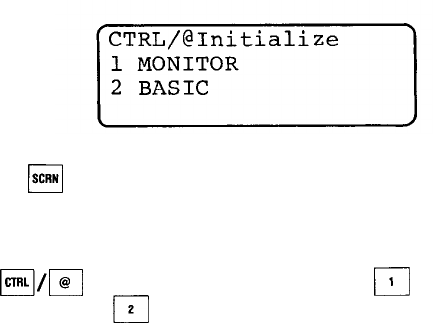
To answer that question, let’s take a look at a particular menu:
(Press
q
to see the top line of this menu on your screen.)
Each line in the menu lists a job the HX-20 may perform, by spec-
ifying a key and the job associated with that key. To choose an item
from the menu, press the key listed next to that item. Thus,
press
m/I@
t
o
initialize the system, press
q
to select the
Monitor, or press
q
to select BASIC. What could be simpler?
Some jobs are always available:
INITIALIZE Initialize memory and the calendar clock. See page 25.
MONITOR The monitor lets you enter and modify machine
language programs. For more information, see the
Epson HX-20 Technical Reference Manual.
BASIC
BASIC lets you enter, change, and run BASIC pro-
grams. See the Epson HX-20 BASIC Tutorial
and Reference Manual.
Your menu may list other jobs as well. For example, one or more
jobs will be listed in your menu if you have installed option ROM
for word processing, telecommunications, or some other applica-
tion. The menu may also list BASIC and machine language pro-
grams that you have stored in memory.
When you press the key for a given item, the menu will disappear
and the HX-20 will begin to perform the job you requested. Thus,
the menu will no longer be active. Instead, the program you selected
will be active. The HX-20 will not be “in the menu” any more, but
will rather be “in BASIC,” or “in the MONITOR,“ or in some other
application. Instead of responding to the menu-viewing keys listed
in Table 4-1, the HX-20 will respond only to keystrokes and
commands recognized by the application you choose.
To use almost any application, however, you must learn to use
the screen editor.
34


















